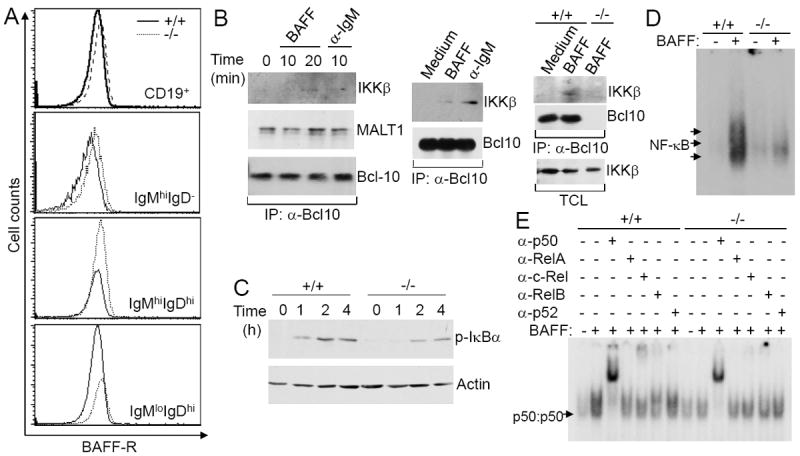Figure 5.

Bcl10 deficiency impairs BAFF-induced canonical NF-κB activation. A, Expression of BAFF-R. Splenocytes from wild-type and Bcl10-deficient mice were stained with antibodies to CD19, IgM, IgD and BAFF-R. Expression levels of BAFF-R on total splenic (CD19+), T1 (IgMhiIgD-), T2 (IgMhiIgDhi), and FO (IgMloIgDhi) B cells were measured by FACS analysis. (B-E) Splenic mature B cells (CD93-) were isolated from wild-type and Bcl10-deficient mice. B, BAFF-induced association of Bcl10 with IKKβ. Wild-type or Bcl10-deficient mature B cells were stimulated with BAFF or anti-IgM for the indicated times. Cell lysates were immunoprecipitated with anti-Bcl10-conjugated Sepharose beads, followed by Western blotting analysis with the indicated antibodies. C, BAFF-induced IκBα phosphorylation. Cells were pre-treated with MG132, and subsequently stimulated with BAFF for the indicated times. Cell lysates were subjected to direct Western blotting analysis with anti-phospho-IκBα or anti-Actin antibodies. D and E, BAFF-induced canonical activation of NF-κB. Cells were stimulated with (+) or without (-) BAFF for 3 hrs and total cell lysates were subjected to NF-κB gel mobility shift (D) and antibody supershift (E) analysis. Arrows indicate the position of NF-κB complexes (D) and p50:p50 homodimers (E). Data are representative of 3 (A, C-E) or 2 (B) independent experiments.
